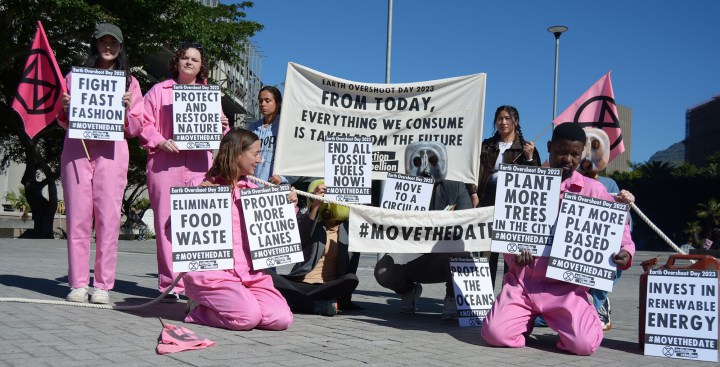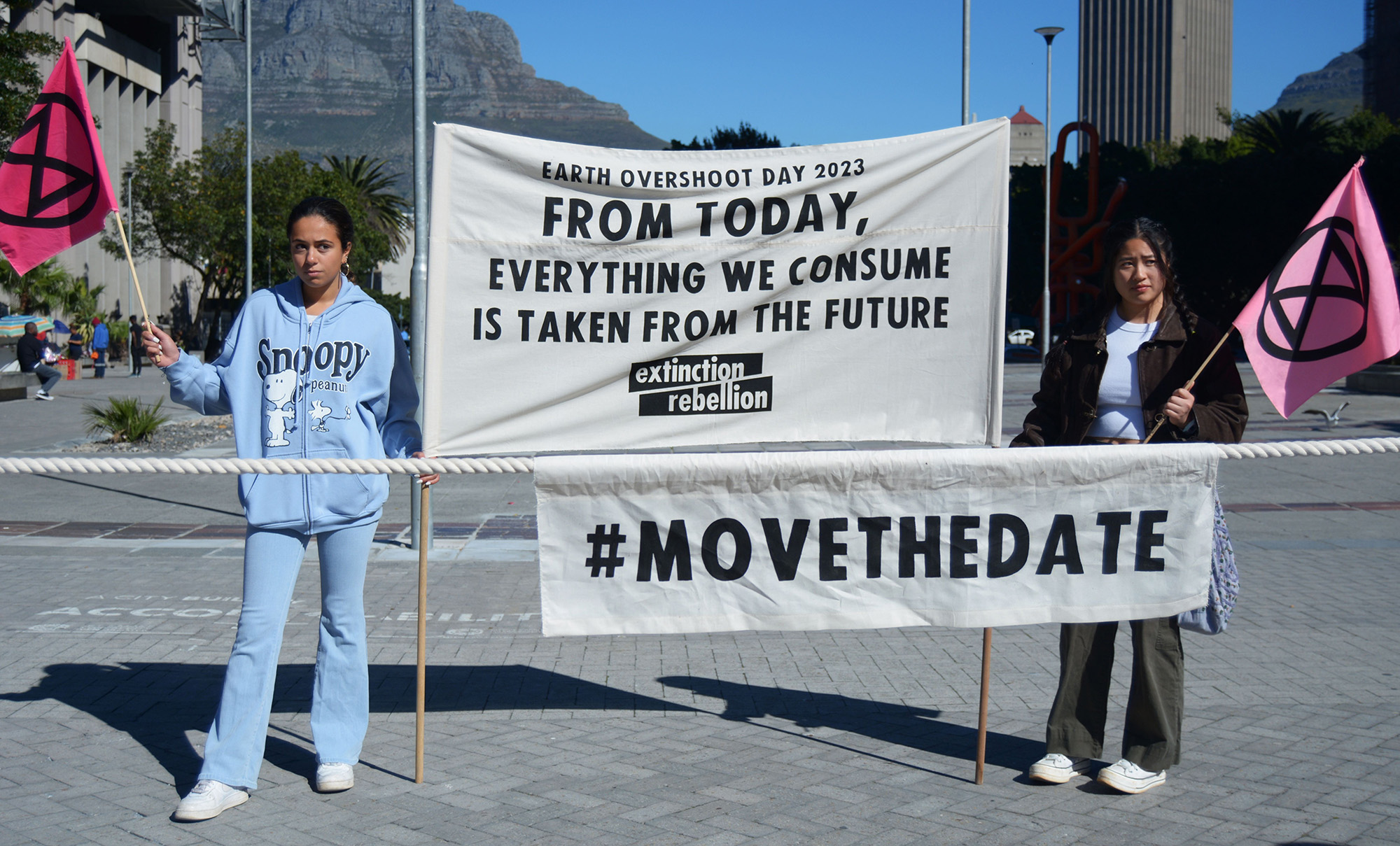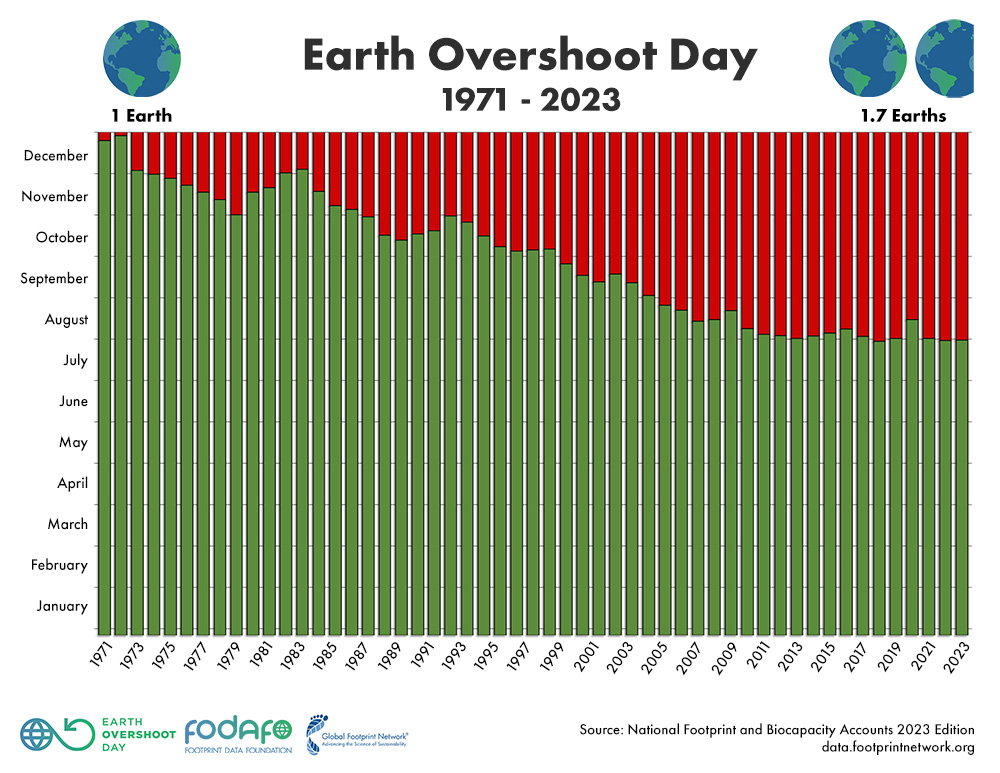EARTH OVERSHOOT DAY
Humanity now lives on natural resources borrowed from the future

Wednesday, 2 August marked a devastating reminder about the severe imbalance between the current use of Earth’s natural resources and that which the planet can produce in a year. In less than eight months, we have arrived at Earth Overshoot Day.
Earth Overshoot Day is calculated every year by the Global Footprint Network to signify the date when the demand for ecological resources and services in a given year exceeds what Earth can reproduce within that year. This means that for the remainder of the year, humanity will be living on natural resources borrowed from future generations.
According to Earth Overshoot Day, the planet maintains this ecological deficit by liquidating stocks of ecological resources and accumulating waste — primarily carbon dioxide in the atmosphere.
If you happened to walk through Cape Town CBD on Wednesday, you would have come across a peculiar tug-of-war taking place outside the Civic Centre between people wearing oil can masks and suit jackets — representing the fossil fuel industry — and people wearing pink jumpsuits — representing climate activists and eco-justice groups.
In the middle of the rope was the sign “Move the date”. The essence of the demonstration was that there is a constant battle between the “fossil fuel industry” seeking to use more of the planet’s dwindling natural resources, and climate activist groups seeking to decarbonise, increase renewable energy uptake and promote more sustainable practices and living.

Climate activists are calling for more urgent action by industries, governments, and individuals to reduce carbon emissions around the world. (Photo: Ziyanda Duba)
This demonstration forms part of protest action by the environmental movement Extinction Rebellion (XR) Cape Town marking Earth Overshoot Day this year.
Earth Overshoot Day also publishes overshoot days for individual countries. South Africa’s Earth Overshoot Day in 2023 fell on 1 June, whereas in 2022 it fell on 29 May.
Read more in Daily Maverick: Humanity is living on borrowed ecological resources, running out of time
XR Cape Town spokesperson Judy Scott-Goldman said, “One of the most powerful ways to move the date in South Africa is to reduce our reliance on fossil fuels. There is much evidence that South Africa could power the country using renewable energy and a shift away from private cars to electrically powered public transport, particularly in cities.
“Our policymakers are well aware of the risks of ‘business as usual’, but actual change is hard and there is resistance from vested interests who are making obscene amounts of money out of the current system. That is why we need to build social pressure and push our politicians to respond to the climate crisis and over-use of the Earth’s resources far faster than the current pace of change. That is why we stand here today in solidarity with others around the world to say #MoveTheDate… or everything dies.”
XR Cape Town’s message was that there are many ways that humans can bring their use of natural resources back into balance with what nature can provide, and that the government needs to take action to implement policies to restore that balance.

Extinction Rebellion protesters are calling on the government to take stringent measures and put legislative structures in place to reduce the global threat of climate change. (Photo: Ziyanda Duba)
During the protest, Zama Timbela, a climate activist from Khayelitsha, said that in his view the main drivers pushing the imbalance between what the Earth can provide and what is being consumed are big corporations and the capitalist systems that advocate for profit over people, which have little regard for the impacts of their actions on the environment and those most vulnerable to a climate in crisis.
“Everything that is produced is produced for profit. So in order to control profit, we as a society need to admit our failures and we need our government to act on this. Government is not harsh on these companies with big emissions, especially oil companies,” he said.
How is Earth Overshoot Day calculated?
To determine the date of Earth Overshoot Day each year, the Global Footprint Network, an international research organisation, calculates the number of days of that year that Earth’s biocapacity can provide for humanity’s ecological footprint. The rest of that year corresponds to global overshoot.
According to its website, “Earth Overshoot Day is computed by dividing the planet’s biocapacity (the amount of ecological resources Earth is able to generate that year), by humanity’s Ecological Footprint (humanity’s demand for that year), and multiplying by 365, the number of days in a year: (Earth’s Biocapacity / Humanity’s Ecological Footprint) x 365 = Earth Overshoot Day.”

Past Earth Overshoot Days. To maintain consistency with the latest reported data and science, the Ecological Footprint metrics for all past years since 1961 (the earliest year data is available) are recalculated every year, so each year’s metrics share a common data set and the exact same accounting method. The annual dates of Earth Overshoot Day are recalculated accordingly. (Image: Earth Overshoot Day website and the Global Footprint Network)
This graphic depicts that in 1971, Earth Overshoot Day was December 25. Now, 52 years later, it fell on 2 August.
Scott-Goldman explained that over these years, the population had skyrocketed from 3.6 billion in 1971 to eight billion people who are eating away at Earth’s natural resource base and pumping more and more carbon dioxide and other greenhouse gases into the air every year, “which are accumulating and causing dangerous climate breakdown”.
Bruce Hewitson, the director of the UCT Climate System Analysis Group (CSAG), said: “Primarily, the world as a whole has yet to make any significant dent in undertaking meaningful changes to the dependency on using fossil fuels, whether through switching to alternate energy sources, increasing efficiencies, reducing consumption or other helpful actions.
“While some countries are making strong efforts, as a global collective the pace of change is too slow… consumption continues. For some, it’s an unwillingness to change lifestyles. For others, there’s an economic constraint, and a myriad of further reasons… none of which really stand up under the scrutiny of the global threat we face.”
For South Africa and Africa as a whole, Hewitson said this is all compounded by issues of political will, the pressures for development, corruption, and more. Overall, he said, South Africa was not making substantial progress in managing its emissions.
“Major change will necessarily come with legislative structures, but of course, we get the governance we vote for, and so the ultimate power is with the voters.
“We need a change of mindset; already we are going to miss the magical target of staying under 1.5°C global warming (that was always somewhat wishful thinking).
“The question really is: “How bad am I willing to let it be before I get engaged with contributing to changing our collective will to act?” DM
To read all about Daily Maverick’s recent The Gathering: Earth Edition, click here.





















I am pleased to see Ms Scott-Goldman highlight the impact that the enormous growth of the human population has had on our environment. So often environmental groups are unwilling to confront this problem head on. But we are still adding approximately 80 million extra people to planet every single year. We desperately need to reach net zero for population growth, and environmental groups should be actively campaigning for this.